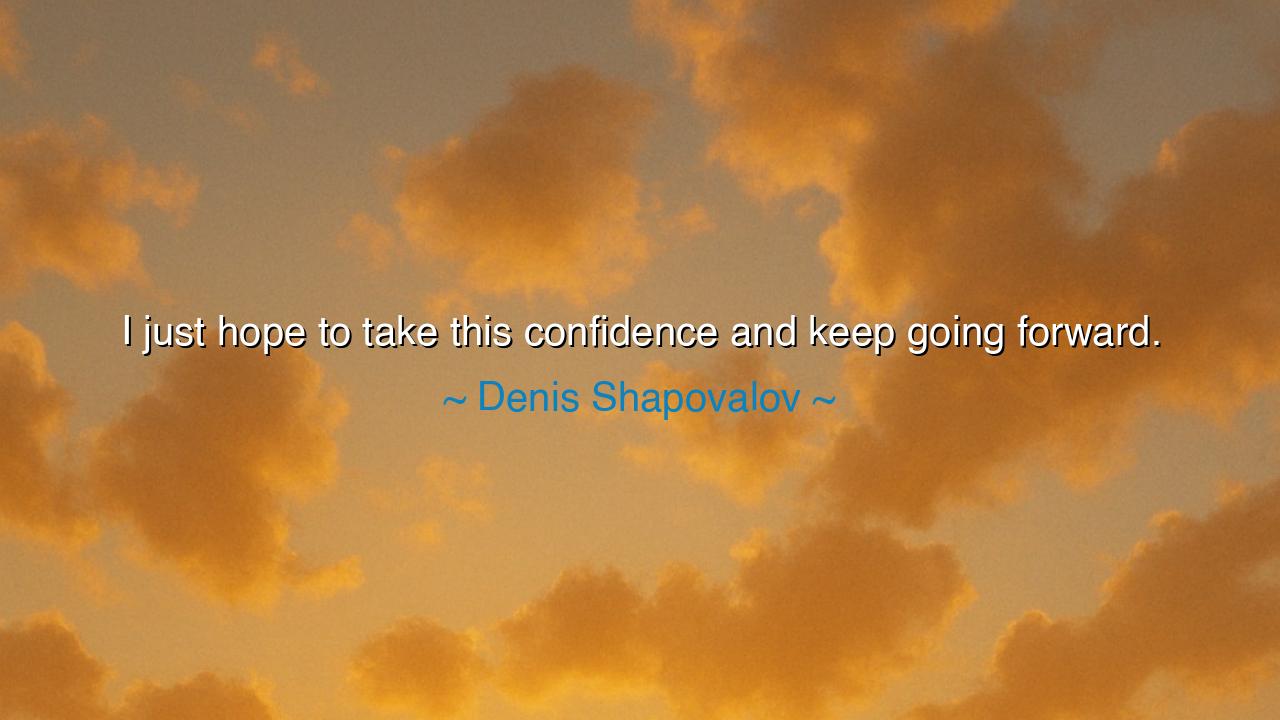
I just hope to take this confidence and keep going forward.






In the councils of striving, hear the lean, flint-bright vow of Denis Shapovalov: “I just hope to take this confidence and keep going forward.” In a single breath he names the ancient rhythm of growth: gather the spark, guard it from the wind, and walk on. Confidence here is not chest-thumping noise but the clear memory of what has just gone right—evidence, not fantasy. And forward is not a boast about destiny; it is a direction chosen again at dawn. Thus the sentence is both prayer and plan: hold the ember; take the next step.
Its meaning is stern and practical. After a good day, the untrained heart feasts on applause and falls asleep. The trained one harvests the lesson, packs lightly, and moves. To “take this confidence” is to convert success into fuel—specific, portable, and ready for the next hill. To “keep going forward” is to refuse two temptations: the backward glance that freezes us in nostalgia, and the sideways glance that wastes us in comparison. Progress is a narrow road with a firm pace; it is made of ordinary strides repeated with uncommon fidelity.
There is, too, humility in the wording. “I just hope,” he says—not “I guarantee.” Hope, in the elder sense, is a disciplined expectancy yoked to effort. It does not command the future; it prepares for it. The sentence marryies inner weather to outer work: steady your breathing, shoulder your craft, and meet the next ball, the next line of code, the next conversation. The harvest comes not from a single radiant act but from a thousand patient turnings of the same furrow.
As for origin, the line is widely attributed to Shapovalov in established quotation collections, reflecting a theme he voiced often in post-match interviews: use the good performance to build the next one. For example, after a deep run in Miami (2019), he spoke of how a result “gives me that confidence to keep going forward,” a phrasing that matches the spirit of the quote and the habit behind it. In other words, the sentence is not a stray slogan; it is the athlete’s working creed.
To make the lesson plain, consider a small parable from the practice court. A young player staggers through months of first-round exits and doubting eyes. One evening she solves a single pattern—a serve wide, a forehand into the open court—and writes it down like a psalm. The next day she wins a set on that pattern, then a match, then a week later she uses it to survive a 0–40 storm. Each time she tells herself, softly, “take this confidence and move.” What saved her was not a miracle but the stewardship of small proof.
History offers a sterner witness. After the loss of a crucial campaign, a statesman stood before his people and vowed not triumph but labor: “We shall fight on.” He did not promise ease; he promised direction. The nation took the “confidence” of having stood a first assault and turned it into factories lit through the night, convoys stitched across dark seas, and voices that would not be silenced. Thus the ancient law: when confidence is converted into disciplined action, it multiplies; when it is hoarded as feeling, it evaporates.
Take the teaching as a rule of life. First, capture evidence: after any success, write three concrete things that worked. Second, ritualize the carry-over: before sleep, name one next step that uses today’s gain tomorrow. Third, protect the pace: do not speed up recklessly after a win; keep the same honest footwork that earned it. Fourth, share the spark: give one teammate a specific affirmation—confidence spreads through precise words. These acts are small, but they keep the ember alive on windy roads.
Let the cadence march with you: hope, confidence, forward. Say it after victories so you do not grow careless; say it after defeats so you do not grow small. For the path to mastery is not a single bannered day, but a procession of steady mornings where yesterday’s proof becomes today’s courage. Hold the ember. Walk on. And when the crowd has gone home and the lights are low, may your craft still hear you whisper, as the ancients would, the only direction worth vowing: keep going forward.






AAdministratorAdministrator
Welcome, honored guests. Please leave a comment, we will respond soon